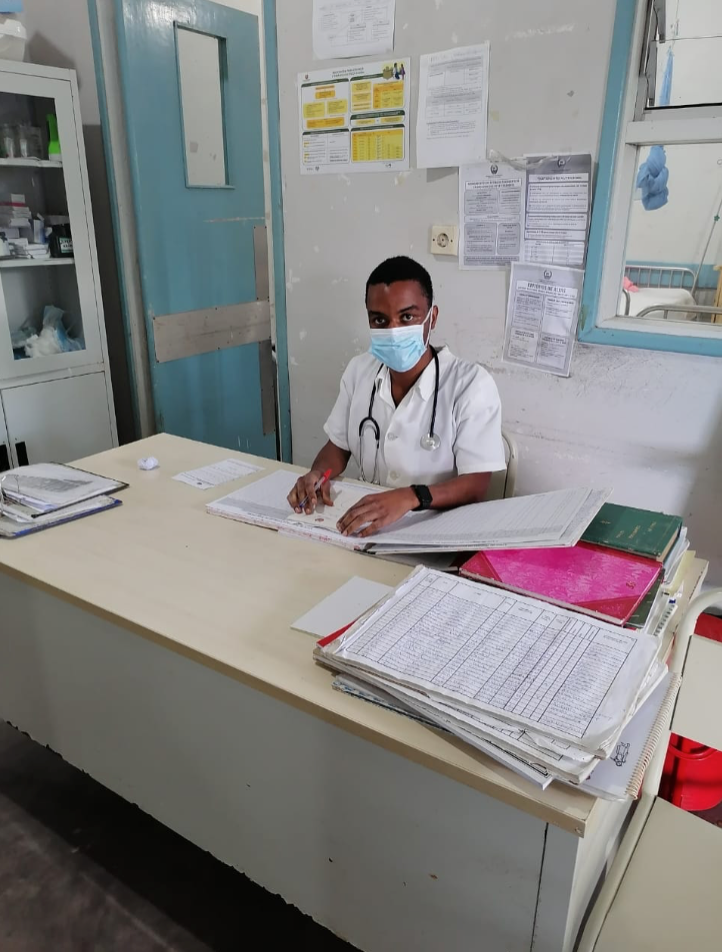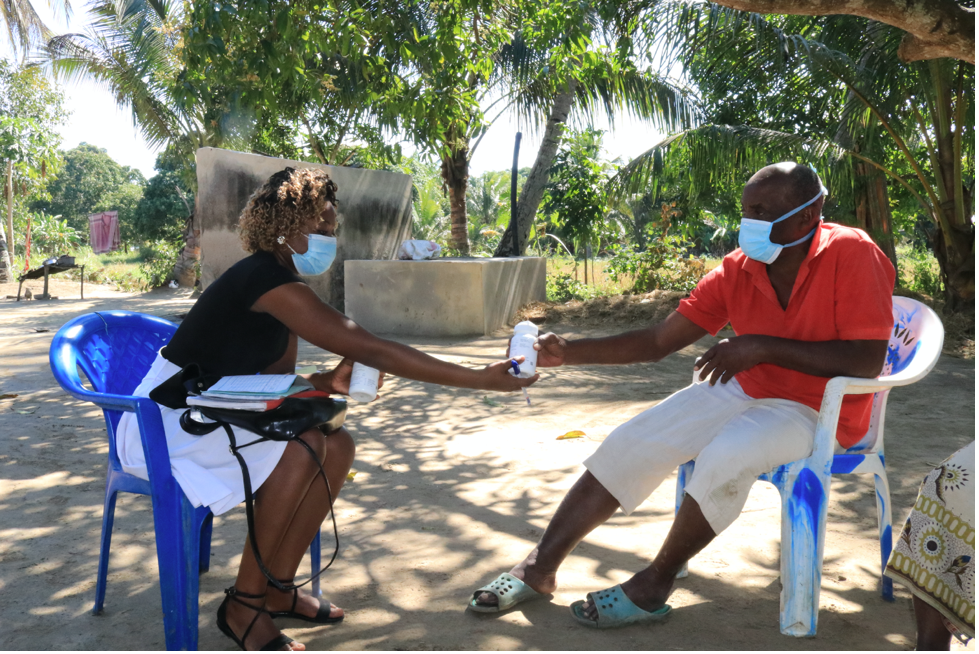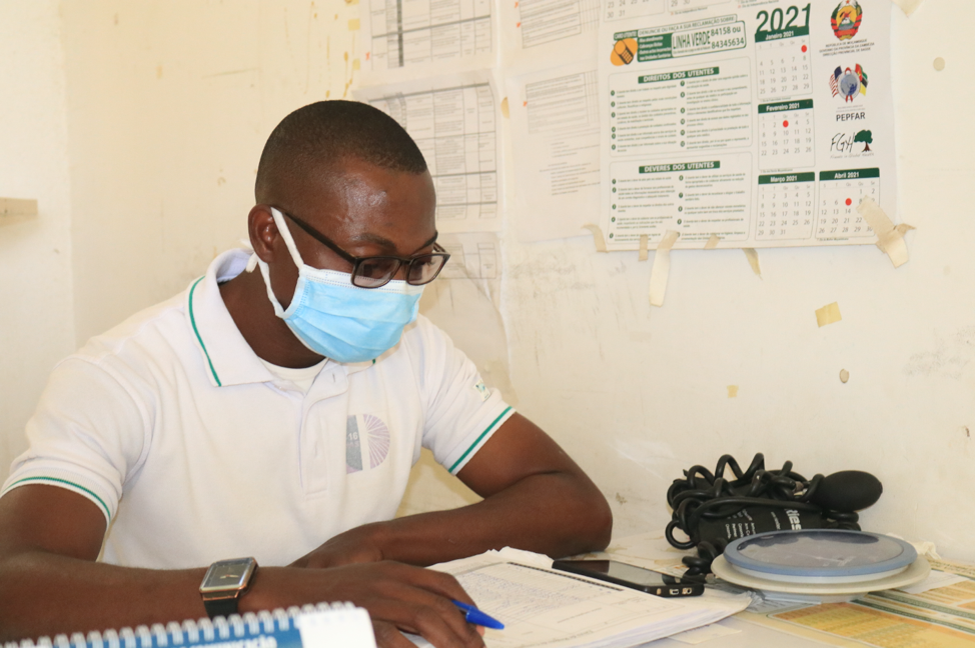
“This intervention allows us to recover every single patient that had interrupted treatment.” Melo Melo, Interim Clinical Director of Namacurra Health Facility.
In January 2021, there was a significant decrease in the number of patients visiting health facilities (HFs) in Mozambique. A combination of the holiday season and a surge in the number of COVID-19 cases kept people away. At the time, as many as 16,660 patients interrupted their HIV care across the 144 FGH-supported HFs in Zambézia Province. Patient Carimo Mamudo Aliz told us, “We are afraid of Corona [COVID-19]…[before] the health facility was packed with people. We are afraid of Corona, but we want to take our medication.”
The overall number of patients currently receiving ART at the end of January 2021 dropped by 3.4%, the largest decrease seen over a month-long period in the last three years at FGH-supported HFs. To address the issue, in February 2021, FGH mobilized 160 Clinical Officers to implement community ART distribution focusing on those patients who had interrupted treatment. Clinical Officers visit patients’ homes to provide ART and Tuberculosis Preventive Treatment (TPT). They reinforce ART adherence messages and clearly explain that patients must visit the HF in person for their next consultation and medication pickup. FGH equipped these Clinical Officers with bicycles, monitoring forms, and basic supplies (e.g., boots, raincoats, and backpacks).
The initiative has been implemented at 47 FGH supported HFs. Nelson Jafar, director of Macuse HF, said that this initiative has brought many gains to his HF’s patient community. “Those patients that had abandoned [HIV] treatment are coming back and are becoming adherent to treatment. The number of patients on [HIV] treatment is increasing.”
Namacurra HF currently serves over 10,000 ART-treated patients, making it one of the largest ART-service delivery sites in Mozambique. Interim Clinical Director, Melo Melo, enthusiastically told us, “This intervention allows us to recover every single patient that had interrupted treatment.”

By the end of June 2021, FGH was supporting the provision of ART to more than 281,000 people living with HIV and this was only possible thanks to the Community ART distribution activity that FGH initiated in February 2021 and intensified during the April through June 2021 period (COP20 Quarter 3).
To understand the impact of community ART distribution on reducing the number of patients interrupting HIV treatment and on the evolution of the overall number of patients receiving ART, a comparison was made between the 47 FGH supported HFs fully implementing community-based distribution of ART and the remaining 97 HFs which were not yet consistently implementing the intervention. From April to June 2021, over 46,790 community-based ART distribution visits were performed by the HFs implementing the intervention consistently, representing 95% of all community ART distributions performed in the reporting period. As a result, when compared to the previous reporting period, the number of patients who interrupted treatment reduced by 53.2% in the HFs that began implementing community ART distribution in Quarter 3 when compared to Quarter 2, and a greater than 4-fold (417%) increase in the number of patients who were more than 28 days past their last expected clinical contact who return to treatment and restarted ART in the reporting period (TX_RTT), when compared to Quarter 2 performance. In the 15 HFs where the community-based ART distribution was initiated back in Q2 COP20 (February 2021), a total of 27,746 (56% of all community ART distributions) were performed in these HFs, and these community ART distributions originated from these supported HFs resulted in a 147% increase in the number of patients who were more than 28 days past their last expected clinical contact who return to treatment and restarted ART in the reporting period (TX_RTT), when compared to Quarter 2 performance.

Considering the positive impact on programmatic indicators, FGH, worked in coordination with provincial health authorities to increase the number of clinical officers implementing community ART distribution to a total of 236.
These results were achieved through the Avante program. Avante is funded by PEPFAR through the Centers for Prevention and Disease Control (CDC) and seeks to control the HIV epidemic by supporting the sustainable implementation of HIV and Tuberculosis (TB) services in Zambézia Province. Avante is implemented by Friends in Global Health (FGH), an NGO affiliated with Vanderbilt University Medical Center. Since 2006, FGH has worked in partnership with the Government of Mozambique at the national, provincial, district, health facility, and community levels in Zambézia Province.